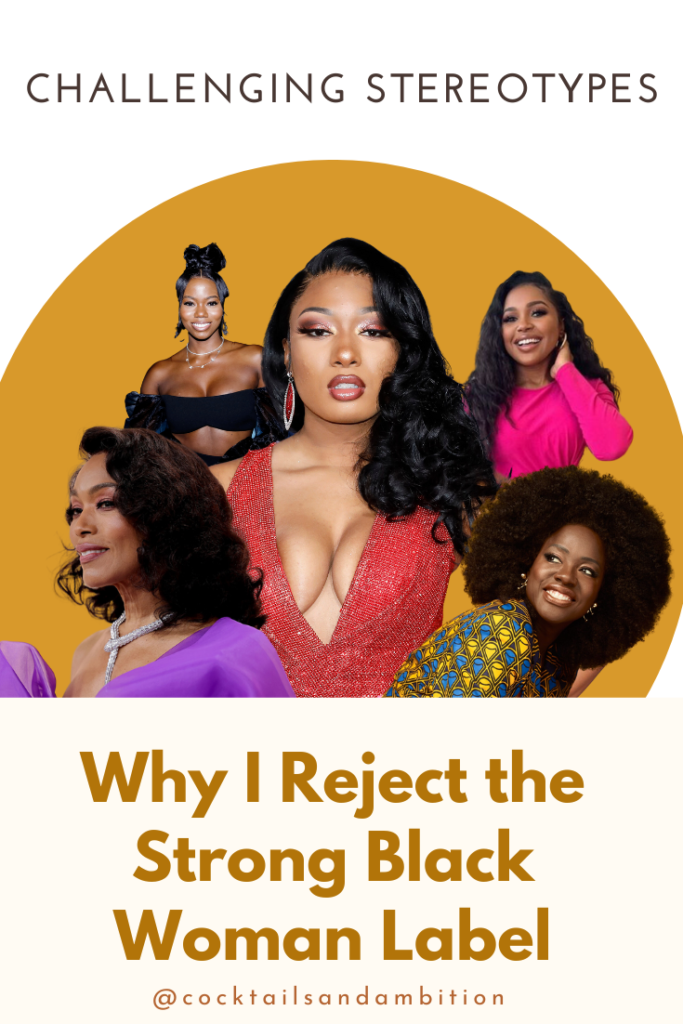
The stereotype of “the Strong Black Woman” has become deeply ingrained in culture. There seems to be a script detailing the role that Black women must play. This role includes being a supporting character with no emotions, no expressions of wants and desires, yet always happy and eternally grateful to be in the background. Black women must at all times be ready with a witty quip, words of encouragement, and a “Yass girl” for everybody but themselves.
As an avid watcher of TV and pop culture, all genres and quality levels included, the strong Black woman trope comes up repeatedly and continues to reinforce harm to Black women. On Netflix’s “the Perfect Match”, we watched a man make zero attempts to get to know the Black woman in front of him, romantically or platonically. Each one of the men decided that the Black women on the show would be their stepping stone in getting to the finish line.
They stated repeatedly “you are such a Strong Black woman” and assumed that these women, just by existing in the periphery of their lives, would always support them, and make them better. None of these men mentioned what they could offer in return.
In another example, we witnessed Angela Basset shows a hint of disappointment at the 2023 Oscars. In a vulnerable moment where she realized she’d lost out on one of the biggest awards in her industry, she was criticized for daring to show disappointment.
The Strong Black Woman stereotype does not afford Black women the opportunity to be human and to express a wide range of emotions. Even in our pain, disappointment and vulnerability Black women are expected to hold it together and put the feelings and comfort of other people above their own. Many of us learned and internalized this message early in life because we had no other choice. Internalizing the Strong Black Woman trope is sometimes out of necessity to survive in a world that makes no space for us. However, to really thrive, and to be able to forge beautiful, peaceful, and meaningful lives for ourselves we must let that label go!
Here are 3 ways I encourage you to reject the Strong Black Woman stereotype.
Let go of unrealistic standards and expectations
As Black women we have so many standards to live up to constantly. There are all these unspoken expectations, including side effects of well-meaning expectations meant to uplift and inspire for example; Black girl magic, Black excellence etc. Living up to the Strong Black Woman trope and expectations requires putting a lot of your emotional and physical needs on the back burner. There is no time to be tired when you have 600 things to do, there is no space for your emotions when you must create and hold space for everyone else.
Realistically, there is only so much you can take, and only so much of yourself you can suppress before you burn out or break down. It’s not a sustainable or healthy way to live. I want you to reject the idea that you must always be strong, resilient, and self-sacrificing. It’s a long process to let go of messages and expectations pushed on us for so long but you do not have to save everyone, you don’t even need to be exceptional a la Black girl magic and all its variations. Sometimes, it’s okay to just be a Black girl and that’s it! you don’t have to be magic to justify your existence.
Embrace Vulnerability and Emotions
My therapist once asked how I would describe myself and I said “Resilient”. My worth at the time was in how much shit I could survive and keep going. The Strong Black Woman stereotype at its core is a rejection of vulnerability. It often requires suppressing any expression of emotions beyond strength and resilience. It’s not to say that being strong or being resilient is a bad thing, but it cannot be the only way we are able to describe ourselves.
Are you kind? happy? angry? sad? joyful? curious? Sometimes we strive so hard to be seen as strong that we forget there are so many other emotions we can feel, and a multitude of ways we can describe ourselves. Allowing yourself to exist outside of being “strong” will ultimately also allow you to foster a deep, more genuine sense of self. By recognizing these ingrained beliefs, we can consciously reject them and embrace the freedom to express our full range of emotions and vulnerabilities.
Prioritize your well-being and redefine what it means to be “Strong”
The ‘Strong Black Woman’ stereotype is connected to increased emotional stress in black women (Godbolt et al, 2022). Internalizing and trying to live up to this stereotype often dismisses our emotional well-being. We are expected to endure hardships silently, without seeking support or expressing our emotions openly. This can lead to emotional exhaustion, burnout, and even mental health issues. Rejecting the ‘strong Black woman’ trope involves prioritizing our own well-being and self-care, setting boundaries and redefining what “strong”means for you
Strength doesn’t mean that you have to constantly deal with hardships and put yourself on the back burner. Being strong can be having the courage to put yourself first, it can be allowing yourself to feel all your emotions fully and deeply, or intentionally carving out time to create moments of joy despite all the forces trying to suck the joy out of you.
